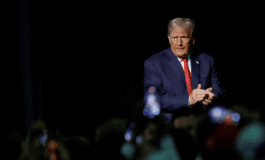
The U.S. president has pressed for tougher U.N. sanctions against Iran over its nuclear program to be passed in a matter of weeks.
Barack Obama, in a joint press conference with Nicolas Sarkozy, his visiting French counterpart, said it was time to get moving on the sanctions after prolonged negotiations with China, Russia, Germany and Britain.

|
|
U.S. President Barack Obama speaks during a joint news conference with French President Nicolas Sarkozy (L) in the East Room of the White House in Washington, March 30, 2010. REUTERS/Jason Reed |
He, however, injected a note of caution, saying that many countries believed their commercial interests with Iran were more important than long-term geo-political interests.
“Now, do we have unanimity in the international community? Not yet. And that’s something that we have to work on,” he said.
Obama said the long-term consequences of a nuclear-armed Iran were unacceptable and that Tehran had so far rejected diplomatic entreaties, but added that the door “remains open if the Iranians choose to walk through it.”
Sarkozy said that along with Angela Merkel, the German chancellor, and Gordon Brown, the British prime minister, “we will make all necessary efforts to make sure that Europe as a whole engages in the sanctions regime.”
The French president said “the time has come to take decisions” on Iran, not to punish it, but to ensure that it “cannot continue its mad race.”
“[Our] fullest support to get stronger, tougher sanctions to the Security Council and take the necessary decisions is what you have,” he told Obama.
Western powers have debated for months over whether to impose a fourth round of U.N. sanctions on Iran, amid doubts over Tehran’s claims that its nuclear program is peaceful and only to produce energy.
Particularly damning was a report in February from the U.N. nuclear watchdog, the International Atomic Energy Agency (IAEA), that said Iran may be working to develop a nuclear-armed missile.
Foreign ministers from the world’s Group of Eight industrialized nations urged the international community to take “appropriate and strong steps” to show its resolve over the nuclear program.
Speaking on Tuesday after the G8 meeting ended in the Canadian city of Gatineau, Hillary Clinton, the U.S. secretary of state, said sanctions were a part of diplomacy and that Iran had repeatedly shown an unwillingness to fulfil its international obligations over the last 15 months.
“That’s the basis on which I express my optimism that we’re going to have a consensus reached in the Security Council,” she told reporters.
“We see a growing awareness on the part of many countries, including China, as to the consequences of a nuclear-armed Iran to regional and global stability, to our oil supply, and we think that there will be a consensus reached as to the best way forward,” she said.
Diplomats say China, which has been reluctant for months to support any sanctions, appears to be slowly coming around.
Chinese support is critical given that Beijing has the power to veto any resolution from the U.N. Security Council.
On Tuesday, a Chinese foreign ministry spokesman said in Beijing that the government opposed Iran acquiring nuclear weapons, but stopped short of backing new sanctions.
“At present, we hope that all sides will make substantive efforts and demonstrate flexibility over the Iran nuclear issue,” the spokesman said.
In their final communique, the G8 ministers said they wanted Iran to comply with demands from the Security Council and co-operate with the IAEA.
“Ministers agreed to remain open to dialogue and also reaffirmed the need to take appropriate and strong steps to demonstrate international resolve to uphold the international nuclear non-proliferation regime,” read the document.
The latest U.S.-drafted sanctions would expand a U.N. blacklist to include members of the Islamic Revolutionary Guard Corps and firms controlled by it.





Leave a Reply